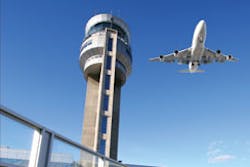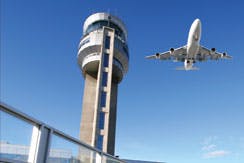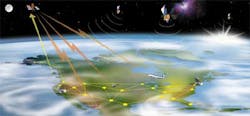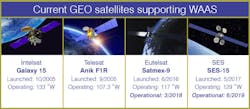FAA selects Leidos to develop GEO 7 satellite to enhance GPS-based air traffic system
“WAAS is an extremely accurate navigation system developed for civil aviation. Before WAAS, the U.S. National Airspace System (NAS) did not have the potential to provide horizontal and vertical navigation for approach operations for all users at all locations. With WAAS, this capability is a reality. WAAS provides service for all classes of aircraft in all phases of flight - including en route navigation, airport departures, and airport arrivals. This includes vertically-guided landing approaches in instrument meteorological conditions at all qualified locations throughout the NAS,” FAA officials say.
Leidos, along with space-segment provider Intelsat General Corporation and technology partners U.S. Electrodynamics Inc. (USEI) and Knight Sky will develop, test, and integrate a satellite payload for the program's new GEO 7 satellite and its associated pair of ground uplink stations. The stations then broadcast GPS navigation data that is corrected and enhanced for accuracy. Leidos will also manage the stations to ensure the satellite sends the augmented GPS navigation signals in line with WAAS requirements.
"For nearly 20 years, Leidos has partnered with the FAA to provide technology solutions that ensure our nation's airspace is safe and efficient for both pilots and travelers," says Leidos Senior Vice President of Transportation Solutions Fran Hill. "This award will allow us to continue to deliver accurate, reliable signals and quality service for years to come."
The new task order has a four-year development phase and one 10-year operations and maintenance phase, and a total contract value of approximately $117 million.
Leidos will perform the work on this FAA contract in Gaithersburg, Md.
The GEO 7 payload is expected to launch in the first quarter of 2020. The system will enter its 10-year operational phase in 2021.
Leidos is a Fortune 500® information technology, engineering, and science solutions and services leader working to solve the world's toughest challenges in the defense, intelligence, homeland security, civil, and health markets. The company's 31,000 employees support vital missions for government and commercial customers. Headquartered in Reston, Virginia, Leidos reported annual revenues of approximately $10.17 billion for the fiscal year ended December 29, 2017.



